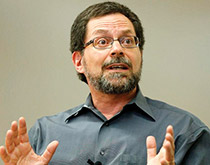Although he now holds one of the most influential government positions a healthcare economist can attain, Martin Gaynor says his introduction to the field came about “by accident.”
It wasn’t until college that he truly discovered economics—“the combination of the rigor of the scientific method with its real-world potential.” He had already completed graduate school when he encountered the branch of economics that would catapult his career. “I literally just stumbled into it,” he recalls, by landing a job working with data that sparked his interest in healthcare markets and healthcare organizations.
 began teaching at Carnegie Mellon’s Heinz College in 1995. Since then, the economics and health policy professor’s award-winning research has focused on competition in healthcare and on the role of incentive structures within the healthcare industry. As he explains it, “I try to take a hard, rational look at issues, but with compassion for impacts on the least fortunate among us.”
began teaching at Carnegie Mellon’s Heinz College in 1995. Since then, the economics and health policy professor’s award-winning research has focused on competition in healthcare and on the role of incentive structures within the healthcare industry. As he explains it, “I try to take a hard, rational look at issues, but with compassion for impacts on the least fortunate among us.”
His often-cited research caught the attention of the Federal Trade Commission, which enforces the U.S. antitrust laws and protects consumers from unfair and deceptive practices. Gaynor has taken a “temporary leave from the university” to join the FTC as its director of the Bureau of Economics, which is responsible for all economic analysis at the FTC.
He says he misses the classroom, but he relishes the chance to help protect consumers from fraudulent, deceptive, and unfair business practices.
—Janet Jay (DC’07)



